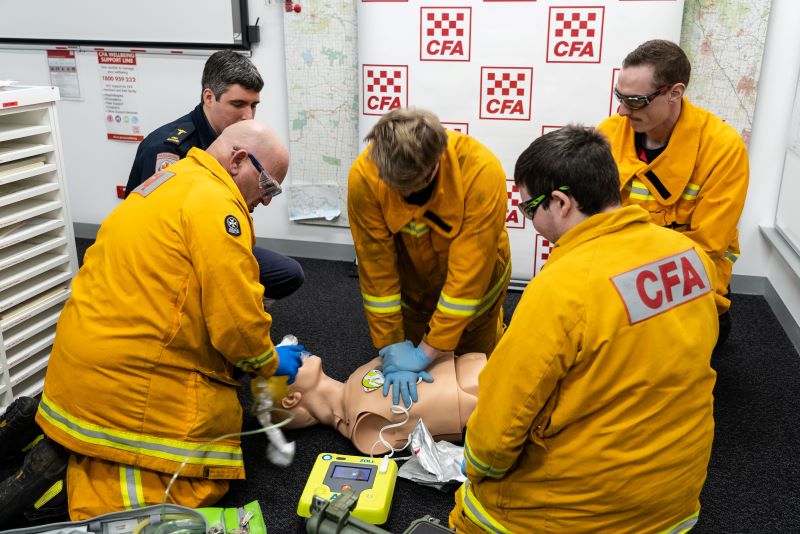 CFA brigades training to respond as part of the Fire Medical Response program
CFA brigades training to respond as part of the Fire Medical Response program
Nine CFA brigades are trained and ready to respond to select medical Triple Zero calls as part of a new program that will officially commence on 27 November.
The new Fire Medical Response program is a joint initiative between CFA and Ambulance Victoria that will see CFA brigades dispatched simultaneously to cardiac arrests with the nearest ambulance.
The nine brigades kicking off the program are Euroa, Tatura, Numurkah, Yarrawonga, Lakes Entrance, Orbost, Bairnsdale, Huntly and Kyneton.
Euroa Brigade Captain Damon Rieusset said the decision to join the program was an easy one, and a chance to make a life-saving difference in rural and remote communities.
"We all know stories of families having to perform CPR at home on loved ones while an ambulance is on the way. In a rural area like Euroa, it can be challenging to have an ambulance on your doorstep in minutes," Damon said.
"If our crews can get there first and start providing care, that could make all the difference for someone's survival.
The nine brigades have been training for months with Ambulance Victoria, while a further 19 are currently enrolling in the program. By the completion of the program rollout, 50 strategically selected CFA brigades around Victoria will participate in the program.
These brigades are located across Victoria in areas that can best complement the Ambulance Victoria response where a CFA brigade may be able to reach a patient sooner.
CFA Deputy Chief Officer Garry Cook said the program was a natural fit for CFA because of the 52,000 volunteers across the state.
"CFA has more than 1,100 volunteer fire stations with more than 52,000 members," Garry said.
"This puts CFA in a unique position to complement the Ambulance Victoria response in 50 locations across Victoria to help deliver early intervention to cardiac arrests."
"What this program means is that community members who call for an ambulance may receive both a fire truck and an ambulance. There is no specific order in which the services arrive to the incident."
Ambulance Victoria Executive Director Regional Operations, Danielle North, said Victoria's cardiac survival rates are one of the best in the world, thanks to high rates of early intervention.
"The Fire Medical Response program will improve survival rates for people in rural and regional Victoria and make access to emergency care in a cardiac arrest more equitable for all Victorians," Ms North said.
"Quick intervention with CPR and a defibrillator has the greatest impact on improving a patient's chances of surviving a cardiac arrest."
"For every minute that CPR is delayed, survival decreases by 10 per cent."






